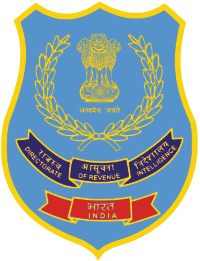Directorate of Revenue Intelligence
The Directorate of Revenue Intelligence (DRI) is an Indian intelligence agency. It is India's apex anti-smuggling intelligence, investigations and operations agency.
| Directorate of Revenue Intelligence | |
|---|---|
 | |
| Common name | DRI |
| Jurisdictional structure | |
| Federal agency | India |
| Operations jurisdiction | India |
| Governing body | Government of India |
| General nature | |
| Operational structure | |
| Headquarters | New Delhi, India |
| Agency executive |
|
| Parent agency | Central Board of Indirect Taxes and Customs (CBIC) (erstwhile Central Board of Excise and Customs) |
| Website | |
| www.dri.nic.in | |
The Directorate is run by officers from the Central Board of Indirect Taxes and Customs (CBIC) who are posted in its various Zonal Units as well as in Indian embassies abroad as part of the Customs Overseas Intelligence Network. It is headed by a Director General of the rank of Special Secretary to the Government of India. The Agency works to secure India's national and economic security by preventing the outright smuggling of contraband such as firearms, gold, narcotics, Fake Indian Currency notes, antiques, wildlife and environmental products. Moreover, it also works to prevent the proliferation of black money, trade based money laundering and commercial frauds.
Legal Mandate
Though its early days were committed to combating the smuggling in of gold, it now addresses a wide and interconnected gamut of narcotics and economic crimes.[1]DRI enforces provisions of the Customs Act in addition to over 50 other statutes including the NDPS Act, Arms Act, WMD Act etc. DRI is also a part of the Cabinet Secretariat's National Authority Chemical Weapons Convention, the Special Investigation Team on Black Money, the Task Force on Shell Companies, the Multi Agency Center (MAC) on National Security, the Ministry of Home Affairs/NIA's special wings on Left Wing Extremism Financing, as well as various inter-ministerial committees on Terror Financing, Coastal Security, Fake Indian Currency Notes, etc.
DRI has earned fame for huge seizures from all its mandated responsibilities, specially gold, fake Indian currency notes, smuggled foreign currency and narcotic drugs and psychotropic substances. In the last 5 years, the DRI has seized more than 540 kg of heroin and 7,409 kg of ephedrine along with other narcotics and psychotropic substances.[2]
Function
DRI is the major intelligence agency which enforces the prohibition of the smuggling of items including drugs, gold, diamonds, electronics, foreign currency, and counterfeit Indian currency. The Directorate of Revenue Intelligence functions under the Central Board of Indirect Taxes and Customs in the Ministry of Finance, Department of Revenue, Government Of India. Headed by Director General (Chief Commissioner Rank) in New Delhi, it is divided into seven zones, each under the charge of an Additional Director General (Commissioner Rank). It is further sub-divided into Regional Units, Sub-Regional Units and Intelligence Cells with a complement of Additional Directors, Joint Directors, Deputy Directors, Assistant Directors, Senior Intelligence Officers and Intelligence Officers.
Charter
- Collection of intelligence about smuggling of contraband goods, narcotics, under-invoicing etc. through sources of India and abroad, including secret sources.
- Analysis and dissemination of such intelligence to the field formations for action.
- Working out of intelligence by the Directorate officers themselves to a successful conclusion, where necessary.
- Keeping watch over important seizures and investigation cases.
- Associating or taking over the investigations which warrant specialised handling by the Directorate.
- Guiding important investigation/prosecution cases.
- Functioning as the liaison authority for exchange or information among ESCAP countries for combating international smuggling and customs frauds in terms of the recommendation of the ESCAP conference.
- Keeping liaison with foreign countries, Indian Missions and Enforcement agencies abroad on anti-smuggling matters.
- To keep liaison with Central Bureau of Investigation and through them with the INTERPOL.
- To coordinate, direct and control anti-smuggling operations on the Indo-Nepal border.
- To refer cases registered under the Customs Act to the Income Tax Department for action under the Income Tax Act.
- To keep statistics of seizures and prices/ rates etc. for watching trends of smuggling and supply required material to the ministry of Finance and other Ministries.
- To study and suggest remedies for loopholes in law and procedures to combat smuggling.[3]
Reward Policy
As per CBIC guidelines, DRI grants rewards to informers for information leading to seizure or recovery of Government dues as an ex-gratia payment. As per extant policy, informers and Government servant are eligible for reward upto 20% of the net sale proceeds of the contraband goods seized (except substances seized under NDPS Act and gold for which separate rates have been notified) and/or amount of duty evaded plus amount of fine and penalty levied/imposed and recovered.
Hierarchy
- Director General (Chief Commissioner)
- Addl. Director General (Commissioner)
- Addl. Director (Addl. Commissioner)
- Joint Director (Joint Commissioner)
- Deputy Director (Deputy Commissioner)
- Asst. Director (Asstt. Commissioner)
- Sr. Intelligence Officer (Superintendent of Customs & Central Excise / Appraising Officers of Customs)
- Intelligence Officer (Inspector/Examiner/Preventive Officers of Customs & Central Excise)
- Class III & Class IV Staff (Ministerial & Constables)
- Officers of DRI are officers from Indian Customs & Central Excise Department on Deputation and Officers from Indian Corporate Law Service
In fiction
Danny Denzongpa plays the Director of Revenue Intelligence Chief in the movie 16 December.
A TV serial on Sony Channel was aired on every Thursday, named Powder, a production of Yashraj Pictures, which was based on DRI.
See also
- General
- Investigation and prosecution
References
- Vyas, Sharad. "DRI unearths Rs. 2,240 cr. banking-hawala scam". The Hindu. Retrieved 9 March 2017.
- http://economictimes.indiatimes.com/news/politics-and-nation/banned-drugs-worth-rs-3000-crore-seized/articleshow/55214615.cms
- Charter of the Organization Archived 20 November 2012 at the Wayback Machine
